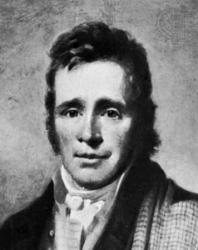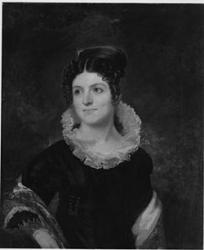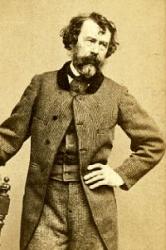Planning worship?
Check out our sister site, ZeteoSearch.org,
for 20+ additional resources related to your search.
- |
User Links
Person Results
‹ Return to hymnal




Export as CSV
James Hogg

1772 - 1835 Person Name: Hogg Hymnal Number: 592 Author of "Lauded be thy name forever" in Hymns for Public Worship Hogg, James, second son of Robert Hogg, was born in Ettrick Forest, Selkirkshire, January 25, 1772, according to his own account, though the baptismal date is December 9, 1770. He is perhaps best known as the Ettrick Shepherd, and friend of Professor John Wilson and Sir Walter Scott. He died November 21, 1835, on his farm of Altrive in Yarrow. An edition of his Poetical Works was published in 1822 in 4 vols. (Edin., A. Constable) including the best of his poems—- The Queen's Wake, 1813; The Pilgrims of the Sun, 1815; Mador of the Moor, 1816, &c. The two hymns by him which have come into use are, "Blessed be Thy name for ever," and "O Thou that dwellest in the heavens high." A complete edition of his prose and verse was pub. in 2 vols., 1865 (Glas., W. G. Blackie).
1. Lauded be Thy Name for ever. Morning. This is "The Palmer's Morning Hymn" (in 32 lines), which forms a part of Canto iv. of his poem Mador of the Moor, 1816. It is sometimes given in this form, but more frequently as "Blessed be Thy Name for ever" (2 stanzas of 8 lines), as in the Society for Promoting Christian Knowledge Hymns, 1852, and others. It is also altered as "Lord of life, the Guard and Giver," as in Mercer, &c.
2. 0 Thou that dwellest in the heavens high. Midnight. This was given,together with music, as "A Cameronian's Midnight Hymn," in 8 stanzas of 4 lines, in his tale of The Brownie of Bodsbeck, 1818. Although found in several collections its use is not so great as that of No. 1. [Rev. James Mearns, M.A.]
-- John Julian, Dictionary of Hymnology
James Hogg
Stephen Greenleaf Bulfinch

1809 - 1870 Person Name: Bulfinch Hymnal Number: 180 Author of "Hath not thy heart with in thee burned" in Hymns for Public Worship Bulfinch, Stephen Greenleaf, D.D. This Unitarian minister was born at Boston, June 18, 1809, and removed to Washington in 1818, his father being the architect of the Capitol. He graduated at Columbian College and the Cambridge Theological School. In 1831 lie was ordained at Charleston, S.C., as assistant to Dr. Gilman. Subsequently he was pastor at Pittsburg, Pennsylvania; Washington, 1838; Nashua, New Hampshire, 1845; Dorchester, Mass., 1852; and "East Cambridge, Mass., 1865. He died at the last place, Oct. 12, 1870. His works include:—
(1) Contemplations of the Saviour; A Series of Extracts from the Gospel History, with Reflections and Original and Selected Hymns. Boston, Carter and Hendee, 1832. This has been reprinted in England. (2) Poems, Charleston, S.C., 1834. (3) Lays of the Gospel, 1845. In addition to these works, which contain his original hymns, he also published (4) The Harp and Cross, a selection of hymns, in 1857.
Those of his hymns which have attained ta the greatest popularity are:—
1. Hail to the Sabbath day. Sunday. In the Contemplations, &c, p. 45. It is appended to Sect. xii. on the “Walk through the corn¬fields," and is in 5 stanzas of 4 lines. It is in extensive use both in Great Britain and America, and is the best known of this author'ess hymns. In many collections it begins with st. ii., " Lord, in Thy [this] sacred hour."
2. Hath not thy heart within thee burned? Presence of Christ. In the Contemplations, &c, p. 148, as the accompanying hymn to the Reflections on Jesus appearing to His disciples on their way to Emmaus, It is in 5 stanzas of 4 lines and is given in the Collections of Beard, Martineau, and others in Great Britain.
3. 0 suffering friend of human kind. Passiontide. The hymn in 4 stanzas of 4 lines appended to Sect. xxxv. on "Peter's confession of Christ," in the Contemplations, &c, p. 109. It ranks next in popularity to ”Hail to the Sabbath day."
In addition to these hymns which best represent Dr. Bulfinch's power? as a sacred poet, the following are also in limited use:—
4. Burden of shame and woe. Crucifixion.
5. Holy Son of God most high. Miracles of Christ.
6. How glorious is the hour. The New Life.
7. It is finished! Glorious word. Good Friday.
8. There is a strife we all must wage. Life's Duty. These are from his Poems, 1834. The next—
9. What power unseen by mortal eye. Cure of Nobleman's Son. From the Contemplations, &c, p. 56.
10. In the Saviour's hour of death. Good Friday. Also from the Contemplations, p. 142:
Dr. Bulfinch's hymns were made known to English readers through Beard's Collection, 1837, in which 19 were given. His hymns throughout are noted for solid and tranquil piety, and deserve a wider circulation than has been accorded to them. They embrace some good hymns on the miracles of Christ. [Rev. F. M. Bird, M.A.]
-- John Julian, Dictionary of Hymnology (1907)
====================
Bulfinch, Stephen Greenleaf, p. 191, ii. Several of this authors hymns, not noted in this Dictionary, were given in Longfellow and Johnson's Book of Hymns , 1846-8. Additional hymns by him in English common use are:—
1. Benignant Saviour! 'twas not Thine. The Compassion of Christ . From his Contemplations of the Saviour , &c, 1832. In Horder's Congregational Hymns. 1884, it reads “Most gracious Saviour! 'twas not Thine."
2. We gather to the sacred board. Holy Communion. This in Horder is from Bulfinch's Communion Thoughts, 2nd ed., 1852.
--John Julian, Dictionary of Hymnology, Appendix, Part II (1907)
Stephen Greenleaf Bulfinch
Caroline Gilman

1794 - 1888 Person Name: Mrs. Gilman Hymnal Number: 292 Author of "Is there a lone and dreary hour" in Hymns for Public Worship Mrs. Caroline Gilman was born in Boston, in 1794. She married the Rev. Samuel Gilman, a Unitarian minister, in 1819. Soon after, they removed to Charleston, South Carolina. Mrs. Gilman has written considerable prose and some poetry.
--Annotations of the Hymnal, Charles Hutchins, M.A., 1872.
==================
Gilman, Caroline, née Howard, daughter of Samuel Howard, and wife of Dr. S. Gilman (q.v.), was b. at Boston, U. S., in 1794, and married to Dr. Gilman in 1819. After Dr. Gilman's death in 1858, she resided for a time at Cambridge, U. S., and subsequently at Tiverton, Long Island. Mrs. Gilman is the author of several tales, ballads, and poems, and of the following hymns:—
1. Is there a lone and dreary hour? Providence. Contributed to Sewall's Unitarian Collection, N. York, 1820, in 4 stanzas of 4 lines, In 1867 Mrs. Gilman added a stanza thereto for the Charlestown Services & Hymns. The original hymn is in extensive use amongst the Unitarians in Great Britain and America.
2. We bless Thee for this sacred day. Sunday. Also contributed to Sewall's Collection, 1820, in 4 stanzas of 4 lines, to which another was added by Mrs, Gilman, for the Charlestown Services & Hymns, 1867. In extensive use. [Rev. F. M. Bird, M.A.]
--John Julian, Dictionary of Hymnology (1907)
=================
Gilman, Caroline (Howard). (Boston, Massachusetts, October 8, 1794--September 18, 1888, Washington, D.C.) Unitarian. She married Rev. Samuel Gilman on October 14, 1819, and after his death in 1858 lived for a time in Cambridge, Mass., and later in Tiverton, Long Island, New York. She began to write stories and poems at an early age, many of which were published in The Rosebud, later called The Southern Rose, a juvenile weekly paper published in Charleston, South Carolina, which she edited for several years, beginning in 1832. Her book entitled Verses of a Lifetime was published in 1854, as were a number of other books which gave her a considerable reputation as an author. Five of her poems are included in Putnam's Singers and Songs, etc.
--Henry Wilder Foote, DNAH Archives
Caroline Gilman
Nathaniel Parker Willis

1806 - 1867 Person Name: Willis Hymnal Number: 548 Author of "The perfect world by Adam trod" in Hymns for Public Worship Willis, Nathaniel Parker, was born at Portland, Maine, Jan. 20, 1807, and educated at Yale College, graduating in 1826. After writing for a time for the American Monthly Magazine, which he established, and theNew York Mirror, into which the former was merged, he was attached to the American Legation at the French Court. His stay in Europe extended from 1831 to 1837. On his return he became in 1839 one of the editors of The Corsair. His works are numerous, and include Sacred Poems, 1843. He died Jan. 29, 1867. His sister, Mrs. Parton, is the well-known "Fanny Fern." His hymn —"The perfect world by Adam trod" (Dedication of a Place of Worship), was "Written to be sung at the Consecration of Hanover Street [Unitarian] Church, Boston," in 1826, and since then has been widely used, although of no exceeding merit. [Rev F. M. Bird, M.A.]
-- John Julian, Dictionary of Hymnology (1907)
Nathaniel Parker Willis
Elizabeth M. Chandler
1807 - 1834 Person Name: Chandler Hymnal Number: 573 Author of "Christian mother when thy prayer" in Hymns for Public Worship
Elizabeth M. Chandler


 My Starred Hymns
My Starred Hymns


